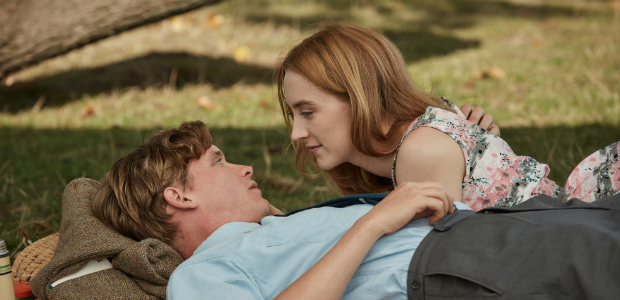On Chesil Beach
Everything is treated with Utmost Gravity without really offering much of reason why we should care.
Plot summary
It is summer 1962, and England is still a year away from huge social changes: Beatlemania, the sexual revolution and the Swinging Sixties. Florence (Ronan) and Edward (Howle) are just married and honeymooning on the dramatic coastline of Chesil Beach in Dorset. However, the hotel is old fashioned and stifling, and underlying tensions between the young couple surface and cast unexpected shadows over their long anticipated wedding night.

On Chesil Beach is an adaptation of the 2007 Ian McEwan novel of the same name. In this tale, Edward (Billy Howlish), a schoolboyish middle class graduate, courts elegant musician Florence (Saisorse Ronan), whose family are well-to-do. After an idyllic romance, the couple’s evident differences result in an unfortunate climax on their wedding night. The tale surrounding this event is one of misunderstanding and terribly, terribly English awkwardness. It is a small story, bringing us back into the lost world of pre-sexual revolution 1962.
McEwan adapted his novel for the screen, and receives an executive producer credit. What we see is very much his, and it is a turgid affair. Everything is treated with Utmost Gravity without really offering much of reason why we should care. Each conversation feels stilted; each gesture pompous. As a result, unintended silliness runs through every scene. The red, silky marital bed could not look more engulfing and vaginal; Florence, the bride clad in blue, could not look more like a petrified Virgin Mary. The unfocused, uncomfortable close-ups of the couple’s faces reveal no deeper layer of meaning. Everything is wildly overplayed, except Florence’s motivations, which get a negligible introduction.
The mix of thudding symbolism and glancing character development is a problem. The questions raised in the film – what do married couples owe each other? And isn’t it awfully sad when people don’t communicate with each other? – feel fatuous rather than insightful. Edward’s pain is centred, tragic, accompanied by a string quartet; Florence’s pain is shrill and then it is offscreen.
After what could well be the slowest first hour and a half of drama committed to film, things accelerate in the final act. But it is a struggle to care. McEwan’s soft spot for nostalgia can be seen in Atonement (2007), a similar tale of a plucky-yet-rough suitor being thwarted in his desire for an aristocratic young lady. In that film, Vanessa Redgrave stepped in to handle the time shift. Here, wigs and prosthetics take over from the young actors, and damage the high realism that brought us this far.
The novel was shortlisted for the Man Booker, and this caused a stir in literary circles. Was it not more of a novella? A quick sketch, rather than a full work? Did it merit a weighty prize? On the evidence of this film, which overstays its almost two hours of screen time, I am inclined to agree with this point of view. There is something depressing about On Chesil Beach. Its self-congratulatory sexual politics. Its easy poignancy. It is as literary as La La Land (2016) a film with a similar structure, was cinematic. And it is much the worse film for it.











COMMENTS